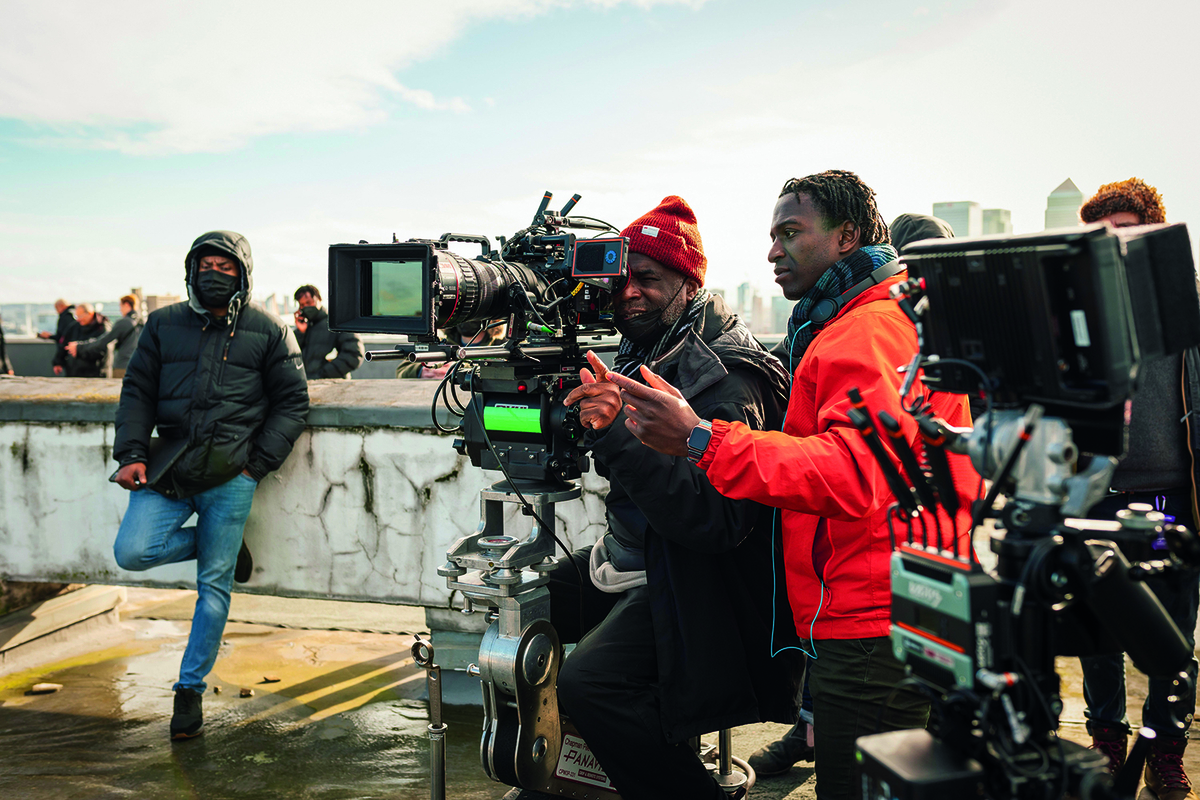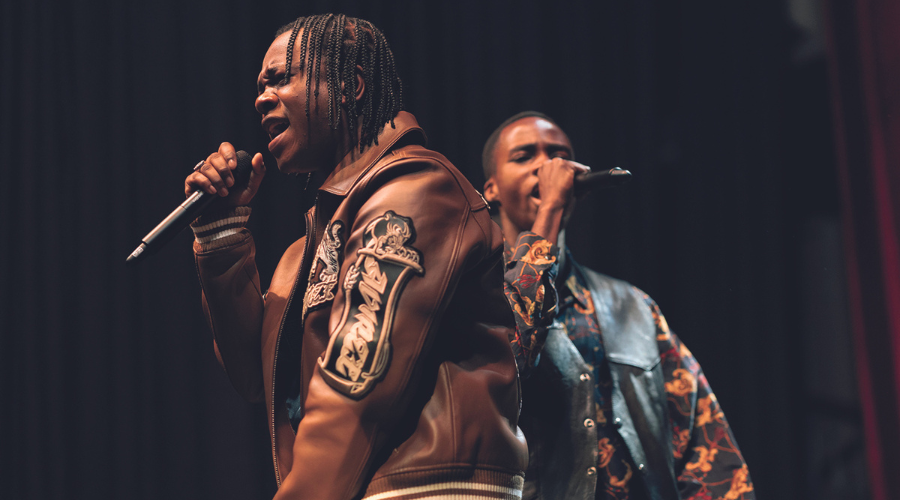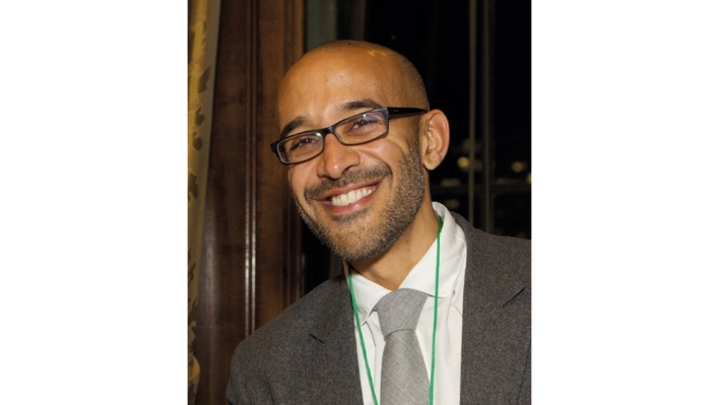Shilpa Ganatra speaks to the makers of coming-of-age drama Grime Kids, which celebrates young urban lifestyles
From episode 1’s opening sequence, Grime Kids aims to smash stereotypes. In a heart-thumping black-and-white scene, violence looks inevitable as audiences are dragged into the world of gritty gangland drama. But when the playground battle commences, the weapons of choice turn out to be water pistols and handfuls of flour. It’s a powerful introduction to the Technicolour, joyous world of Theresa Ikoko’s Grime Kids.
The BBC Three series is based on grime legend DJ Target’s autobiography of the same name. It takes us back to Bow in east London, in 2001, when the city’s underground jungle, garage and hip-hop music scene shaped the genesis of grime and Target’s formative years. Yet, as a nostalgic coming-of-age series about friendship and growing pains, it has more in common with Derry Girls and Raised by Wolves than the likes of Top Boy.
“The opening is very deliberate,” says executive producer Tom Leggett of Mammoth Screen, which made the series. “You expect to be in the Kidulthood/Top Boy space, and then, suddenly, you’re exploding into a water and flour fight. All credit to Top Boy – it’s been a hugely successful show, and it’s incredibly well written, acted and directed. But Grime Kids depicts the flip side of the British urban life they’re portraying. It’s warm, celebratory and fun in tone, rather than about violence or criminality.”
The idea began in the offices of Mammoth, which was looking for a show that spoke to Britain’s role in contemporary international music. The biography of BBC Radio 1Xtra presenter DJ Target – a founding member of grime collective Roll Deep, which also featured Skepta, JME, Wiley and Dizzee Rascal – was perfect source material.
To flesh out a story, they approached Ikoko, who had grown up in nearby Hackney, one of nine siblings born to a single Nigerian mother. While working a day job in the community and youth services sector, Ikoko made waves as the writer of the award-winning play Girls – about the friendship of three young women kidnapped by Islamic extremists – and the 2019 social realist film Rocks.
Ikoko has shifted the focus of Target’s autobiography to the people and connections between the music. She recalls: “There was a little anecdote in Target’s book about him and his friends having a food fight with frozen patties in a patty factory, and that resonated with me. Those moments felt so magical.”
The book lays out the blueprint of the world they are in: we see Roman Road (Bow’s main shopping area), the Rhythm Division record store, and the tower block that houses influential radio station Rinse FM. But the story itself centres around the “Gladiator crew” – Dane (played by Yus Jamal Crookes), Junior (Gabriel Robinson), Kai (Shanu Hazzan), Bishop (Tienne Simon) and Bayo (Juwon Adedokun). They have just finished their GCSEs and have a summer of possibilities awaiting them.
Their rites of passage are painfully relatable: becoming tongue-tied with a crush, getting turned away from a club for a first time, discovering alcohol but quite not knowing what to do with it. Bayo confidently orders a sherry at a bar because he saw it on TV.
While these endearing moments give Grime Kids a broad appeal, Ikoko explains that the show was written primarily for families living on east London estates. “The hope is that other people who look like them or live like them will also feel loved by the story. I also hope that the specificity of the story brings out the universality of experience, so that people who live in a village in Leicestershire will think, I know what it is to fall out with a best friend. I know what it is to grieve. I know what it is to want to say to my dad: ‘I know you love me, but I wish you liked me,’” she says.

Casting was done via traditional and “open call” methods. Altogether, 600 young men auditioned for the roles, most of them through the open call system run by Bafta-winning casting director Jessica Straker, who specialises in representative and street casting (her credits include Rocks and Steve McQueen’s Small Axe).
People from non-acting backgrounds were contacted via ads, outreach and word of mouth. Ikoko says: “We wanted to make sure that anyone who wanted to audition had the opportunity to be seen.” This was how they found Crookes and Delove Akra, who plays Dane’s crush Genevieve – both of whom bring great talent to the show.
Ikoko says she was determined to make auditioning a positive experience, “where people felt they got something from it, even if they walked away without a role”. Food was provided and some of the lengthier workshops were paid.
When it came to depicting real-life characters, the producers turned to the people the actors were playing; grime megastar Wiley spoke to Ivandro Cruz, who plays him in the show, while Rinse FM founder Geeneus, a consultant on the series, picked Jack Bannon to play him.
Target and Geeneus’s involvement in the production helped tease out the show’s authenticity. They offered rich detail on the music, lingo and aesthetics of the time. Geeneus even loaned the original turntables and props used by Rinse FM. But, overall, the on-screen world was brought to life thanks to a passionate commitment from all concerned, not least the set designers and music department.
Leggett says: “One of the amazing things about making this show is that, for a lot of people who came to work on it, it wasn’t just another job. It reflected their culture and was personal to their lives.
“On a production level, it was a show that filmed in a lot of locations, which brings its own share of complexity. There were a lot of challenges, but lots of great people around us.”
It was Ikoko’s first foray into television, and she was struck by how TV differs from film and theatre – particularly the speed at which the process operates and the director’s role. She says: “When I heard how late the director comes on board, I didn’t think that could work. How could a director come on board that late and understand what I want to do and how I want to do it?
“Me and Abdou Cissé, the director of block one [of the episodes], had a three-hour conversation on the phone every day for a year before we started filming. We were committed to forming a bond and sharing that vision. We conversed about film and TV, about characters, about books, about the things I dislike and love regarding the portrayal of women.
“I learned from him as well.
“I learned the word ‘interstitial’ from him because he would ask me about how I wanted the world to breathe between the scenes. I started to incorporate that into my writing, and factor in these little delicate breaths.”
She adds: “It wasn’t the easiest show to make but the heads of department went out of their way to stay true to the show’s vision. As much as it was my vision, it was a vision that was pushed and pulled and grew around all the amazing artists who were so generous with their gifts.”
Grime Kids is an important step forward in showing off the multifaceted, characterful world of inner-city life, thanks in no small part to its focus on grime rather than crime. And that’s music to our ears.
Grime Kids launched on BBC Three on Monday 13th November and will air weekly at 10pm. All episodes are now available as a boxset on BBC iPlayer.







